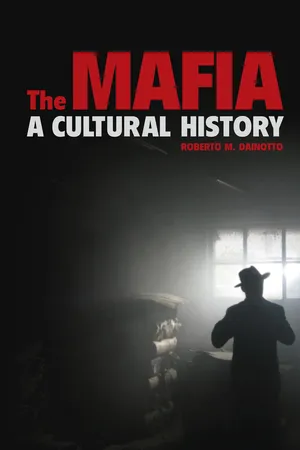![]()
References
Unless otherwise specified, translations are by the author.
Preface
1 Sam Roberts, ‘Mario Cuomo, Vocal Foe of Italian Stereotyping, Finally Sees The Godfather’, New York Times (21 October 2013), p. 12.
2 Tracy Wilkinson, ‘Luck Finally Runs Out for Italy’s Boss of Bosses’, Los Angeles Times (12 April 2006), pp. 7–8.
3 Hannah Arendt, Eichmann in Jerusalem: A Report on the Banality of Evil (New York, 2006), p. 250.
ONE Of Rustic Knights and Godfathers: The Origin of the Mafia
1 Cited in Fred Baker and Ross Firestone, Movie People (New York, 1972), p. 53.
2 Francis Ford Coppola, Francis Ford Coppola: Interviews, ed. Gene D. Phillips and Rodney Hill (Jackson, 2004), p. 169.
3 Jon Lewis, ‘If History Has Taught Us Anything . . . Francis Coppola, Paramount Studios, and The Godfather Parts I, II, and III’, in Francis Ford Coppola’s The Godfather Trilogy, ed. Nick Browne (Cambridge, 2000), p. 47.
4 Phoebe Poon, ‘The Corleone Chronicles: Revisiting The Godfather Films as Trilogy’, Journal of Popular Film and Television (2006), p. 193.
5 Bob Mondello, ‘Godfather III: A Staggering Saga’, All Things Considered (24 December 1990).
6 Naomi Greene, ‘Family Ceremonies: or, Opera in The Godfather Trilogy’, in Francis Ford Coppola’s The Godfather Trilogy, ed. Browne, p. 133; Marcia J. Citron, ‘Operatic Style and Structure in Coppola’s Godfather Trilogy’, Musical Quarterly, LXXXVII/3 (2004), p. 452; George De Stefano, An Offer We Can’t Refuse: The Mafia in the Mind of America (New York, 2006), p. 129.
7 André Bazin, What is Cinema?, trans. Hugh Gray (Berkeley, CA, 2004), I, p. 25.
8 Sergei Eisenstein, Film Form: Essays in Film Theory, trans. Jay Leyda (New York, 1949), p. 49.
9 Jonathan J. Cavallero, Hollywood’s Italian American Filmmakers: Capra, Scorsese, Savoca, Coppola, and Tarantino (Urbana, IL, 2011), p. 120.
10 Citron, ‘Operatic Style’, p. 452; Greene, ‘Family Ceremonies’, p. 135.
11 John Paul Russo, ‘Redemption in Francis Ford Coppola The Godfather: Part III’, in Mafia Movies: A Reader, ed. Dana Renga (Toronto, 2011), pp. 153–4.
12 Citron, ‘Operatic Style’, p. 438.
13 Greene, ‘Family Ceremonies’, p. 140.
14 Cited in Lars Franke, ‘The Godfather Part III: Film, Opera, and the Generation of Meaning’, in Changing Tunes: The Use of Pre-existing Music in Film, ed. Phil Powrie and Robynn Jeananne (Aldershot, 2006), p. 31.
15 Vera Dika, ‘The Representation of Ethnicity in The Godfather’, in Francis Ford Coppola’s The Godfather Trilogy, ed. Browne, pp. 82–92.
16 Michele Colombo, Il romanzo dell’Ottocento (Bologna, 2011), p. 102.
17 Benedetto Croce, La letteratura della nuova Italia (Bari, 1964), IV, p. 332.
18 Giovanni Verga, Luigi Capuana and Gino Raya, Lettere a Luigi Capuana (Florence, 1975), p. 31.
19 Ibid., p. 49.
20 Giovanni Verga, Tutte le novelle, ed. Carla Riccardi (Milan, 1979), p. 202.
21 Gino Tellini, Il romanzo italiano dell’Ottocento e Novecento (Milan, 1998), p. 180.
22 Cited in Giacomo Debenedetti, Verga e il naturalismo (Milan, 1993), p. 318.
23 Verga, Capuana and Raya, Lettere a Luigi Capuana, p. 114.
24 Ibid., p. 114.
25 Cited in Claudia Petraccone, Le due civiltá. Settentrionali e meridionali nella storia d’Italia dal 1860 al 1914 (Bari, 2000), p. 166.
26 Verga, Novelle, p. 130.
27 Piero Bevilacqua, Breve storia dell’Italia meridionale dall’Ottocento a oggi (Bari, 1993), p. 34.
28 Salvatore Scarpino, La guerra cafona. Il brigantaggio meridionale contro lo Stato unitario (Milan, 2005), p. 10.
29 Christopher Duggan, A Concise History of ltaly (Cambridge, 1984), p. 140.
30 Salvatore Lupo, History of the Mafia, trans. Anthony Shugaar (New York, 2009), pp. 31–2.
31 Petraccone, Le due civiltà, p. 57.
32 Daniel Pick, Faces of Degeneration: A European Disorder, c. 1848–c. 1918 (Cambridge, 1989), pp. 109–54.
33 Salvatore Cafiero, Questione meridionale e unità nazionale 1861–1995 (Rome, 1996), pp. 32–5.
34 Pasquale Villari, Le lettere meridionali ed altri scritti sulla questione sociale in Italia (Florence, 187...
